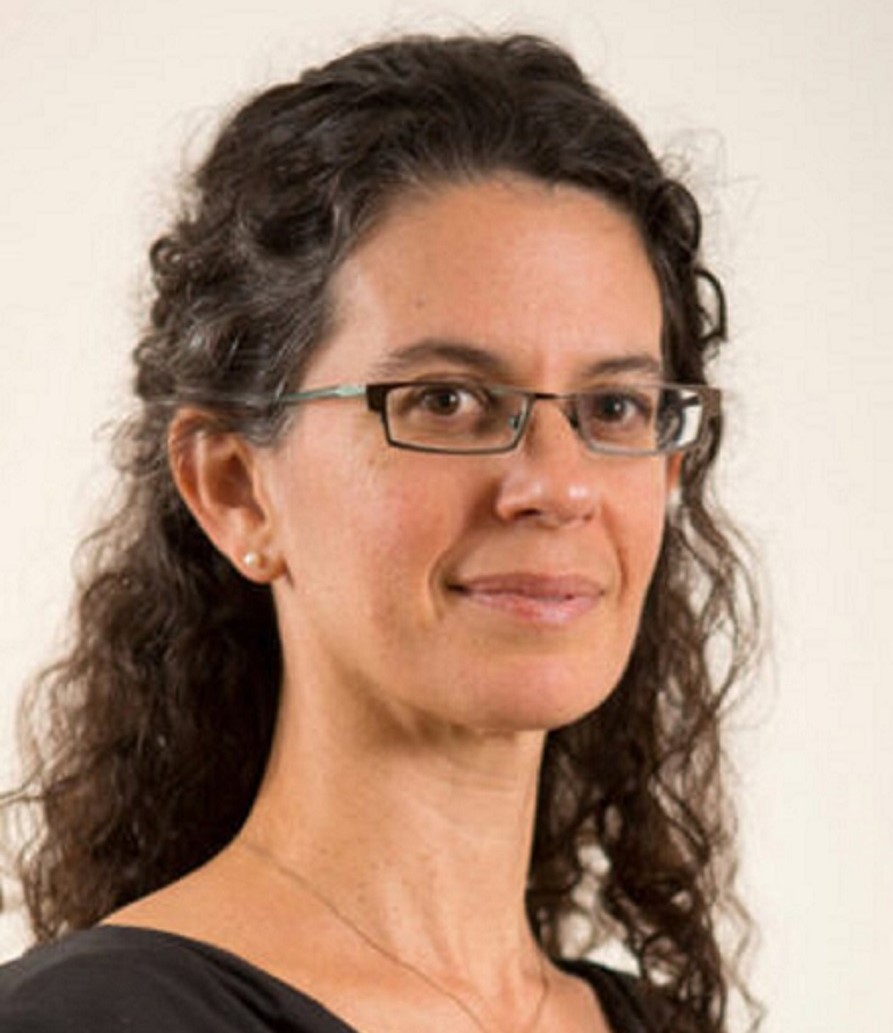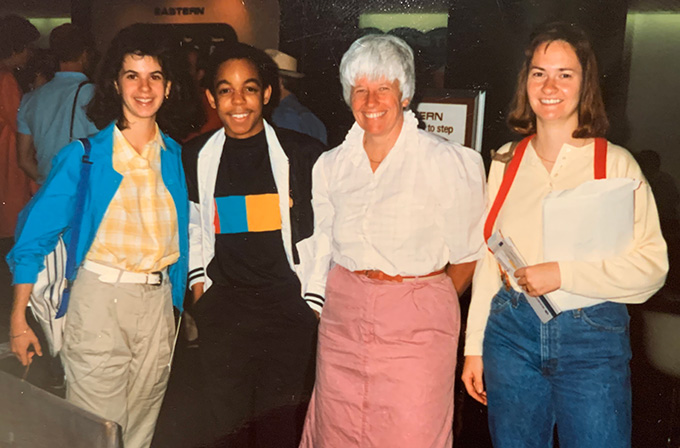Conversations with Maya: Dianne K. Newman

Maya Ajmera, President & CEO of the Society for Science & the Public and Publisher of Science News, chatted with Dianne K. Newman, an alumna of the International Science and Engineering Fair and the Gordon M. Binder/Amgen Professor of Biology and Geobiology at Caltech. She is a MacArthur Fellow, Fellow of the American Academy of Microbiology and member of the National Academy of Sciences. We are thrilled to share an edited summary of their conversation.
You are an alumna of the 1987 and 1988 International Science and Engineering Fair (ISEF). How did the competition impact your life?
ISEF was by far the most memorable thing I did in high school. ISEF 1987 was the highlight because it was held in Puerto Rico. I grew up in South America, so I really enjoyed going back to a Spanish-speaking place. Beyond the tourist value, I loved the experience of being taken seriously as a scientist at that very young age. It gave me confidence.
I also gained lifelong friendships with the two women who took me to ISEF: Nancy Aiello and Sally Wrenn, who were the directors of the Virginia State Science and Engineering Fair (VSSEF). More than anything, the encouragement they gave me during that fair, and ever since, has been the most important thing I took from ISEF.
That particular year at ISEF, I won a second-place award in physics, which was shocking. I didn’t expect to win anything. The most important memory I have is of my father, who joined me at VSSEF. I’ll never forget the look of joy and pride in his eyes as I was explaining my project during the final round of judging. It’s one of my most cherished memories.
My love for scientific research was enabled by my parents, neither of whom were scientists, and my confidence in my scientific abilities was reinforced by participating in science fairs. It motivated me to pursue science and engineering in graduate school.

You originally entered an environmental engineering program at MIT but then moved to microbiology. What prompted the change?
Serendipity. During my first semester at MIT, I took a course in environmental microbiology where I wrote a research paper about the degradation of perchloroethylene, a solvent that was contaminating groundwater. Through this assignment, I learned that microbes could eat toxic molecules and oxidize them to CO2. I thought bioremediation was remarkable and totally fascinating. When I realized that microbes are quite literally the best chemists on Earth, I was captivated and wanted to know more.
Your lab looks at the coevolution of life and Earth. Tell me more about what you’re working on right now.
I am fascinated by how microbes thrive under conditions where oxygen is scarce and they are growing slowly. For almost two decades, we’ve been researching a versatile class of metabolites called phenazines, which are redox-active pigments made by diverse bacteria. Phenazines are fun to play with in the lab because they are so colorful, but they also have many important physiological and ecological functions. They can be both lifelines, sustaining cells’ viability under anoxic conditions, or agents of chemical warfare, serving as natural antibiotics. Which effect they have depends on the organism and its environment. Bacteria that make phenazines hail from the soil, yet can become important human opportunistic pathogens.
Accordingly, we strive to take what we learn in the laboratory about phenazine biology and see how relevant it is in the context of crop rhizospheres, the zone of the soil in the vicinity of plant roots, and human chronic infections. Trying to understand how phenazines affect their producers and other organisms in their vicinity under conditions that are environmentally relevant is challenging, but offers the chance to gain new insights into what structures and sustains microbial communities and how these communities, in turn, affect the host — plants or humans. These insights help us think creatively about how to modulate such communities towards good ends, such as new strategies to control chronic infections that tolerate conventional antibiotics.
You received the MacArthur Fellowship in 2016. How has the fellowship impacted your career?
The fellowship provided tremendous encouragement to keep taking risks and trying to aim high. It further inspired me to think about creative ways that we could extend what we know in directions that are beneficial to society. Since receiving the award, I took a step back and asked where our work could have a greater impact. I concluded that one area is soil fertility and food security, and we are beginning to turn some of our research in that direction.
In 2019, you were inducted into the National Academy of Sciences — a year when a historic number of women were elected to the academy. In your opinion, what challenges are women facing today in science and engineering?
There’s never been a better time to be a woman in science. There are many mechanisms in place to enable women to succeed, from greater efforts to recruit women to the workplace, to foundations that provide research support to women, to programs that allow for balancing career with family. In fact, an academic career is very compatible with raising a family. I like to spotlight that for young people because sometimes that message gets lost in conversations about work-life balance. It’s difficult to imagine a career that provides more independence and flexibility than a life in academia.
In my direct experience, I feel I’ve been given every opportunity and even some advantages because I am a woman. That said, as I’ve advanced in my career, I’ve become more aware of the subtle ways that there is still bias in the workplace. In some departments, the culture of testosterone can still be felt in something as simple as how questions are asked in seminars. There have been a few moments where I felt that the way certain senior male colleagues were talking to me was impacted by my gender in a way that was not OK and was uncomfortable. I hope that those types of interactions fade out with time.
What strategies are you employing around diversity, equity and inclusion?
All my life I have been invested in diversity, equity and inclusion. I volunteered in various communities where I was doing my studies to encourage young people of color and help them get into STEM. As a faculty member, I made a point to recruit women, minorities and international students to my lab. In fact, when I started, more Spanish was spoken in my lab than English. Attracting the greatest pool of talent to STEM is very important to me.
I am now working to start local partnerships with schools near Caltech that have a high proportion of first-generation and underrepresented minority students to develop teaching and mentoring relationships between our graduate students and the students at those institutions. We believe that the pool of talent is distributed uniformly across the population. In order for Caltech to continue to be one of the best schools for science and engineering in the world, it needs to look like our population.
We’ve been doing much better with regard to Latinx recruiting at the undergrad level. We’re aspiring to do as well at the graduate, postdoctoral and faculty levels for all people of color. It takes time, but we are building a pipeline in a very sincere way. I’m optimistic and think we’re going to get there.
What advice do you have for young people? Do you have any words of wisdom?
Be true to yourself and what excites you. Don’t be afraid of failing. If you are genuinely interested in something, go for it. Don’t let getting one bad grade deter you. Recognize that you’re playing the long game, and that you can excel in something long-term even if you need a little bit of a stepping stone in the short term.
There are so many challenges in the world today. What’s keeping you up at night right now?
I worry that our society is too focused on individualism and individual rights, before the collective good. That is something that is very troubling, and we must change our mind-sets if we’re going to address the myriad challenges in the century ahead. I think that climate change is the existential challenge of our time. It’s the type of thing that must be handled in a collective way, internationally, globally. And so the worry is, are we going to be able to pull that off? I don’t know.


